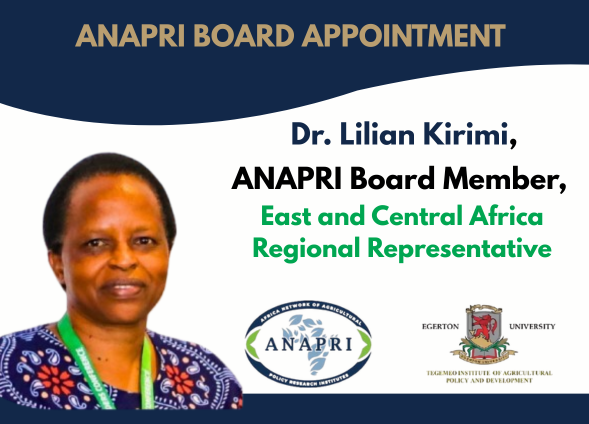
Tegemeo Institute of Agricultural Policy and Development, Egerton University, is proud to announce the distinguished appointment of Dr. Lilian Kirimi to the Board of the African Network of Agricultural Policy Research Institutes (ANAPRI)—a premier continental platform that brings together leading agricultural policy research institutions across Africa to advance evidence-based policy formulation and implementation. She was appointed, along other members namely; Prof.Andrew E. Temu, Board Chairperson, Dr.Vera Songwe, Finance and Audit Expert, Dr.David Nielson, Institutional Development and Partnerships Expert, Dr.Salomo Mbai, Southern Africa Regional Representative, Prof.Peter Quartey, West and North Africa Regional Representative and Dr.Ndèye Fatou Faye, Technical Representative,which took place during the 23rd ANAPRI Board meeting, from January 22-24, 2026, at Victoria Falls Resort, Zimbambwe.
Dr. Kirimi’s appointment reflects her stature as a nationally and regionally respected agricultural economist and policy research leader, whose work continues to shape discourse at the intersection of research, policy, and development practice. She currently serves as a Senior Research Fellow and Research Coordinator at Tegemeo Institute, where she has played a pivotal role in generating rigorous policy-relevant research that informs government decision-making, donor programming, and institutional reform within Kenya and beyond.
She holds a Doctor of Philosophy (Ph.D.) in Agricultural Economics from Michigan State University (USA), alongside a Master’s and Bachelor’s degree in Agricultural Economics from Egerton University. This strong academic foundation has enabled her to bridge advanced economic theory with applied policy analysis tailored to the realities of African agricultural systems.
At the national level, Dr. Kirimi is widely recognized for her contributions to agricultural transformation,food security, value chain development, production economics, gender-responsive policy analysis, and institutional economics. Her research has informed key policy discussions on smallholder commercialization, climate-resilient agriculture, market access, and the design of inclusive agricultural support systems. Through her work, she has consistently supported Kenya’s broader development agenda by translating research evidence into actionable insights for policymakers and development partners.
Dr. Kirimi has also provided leadership in multi-stakeholder research initiatives involving government ministries, county governments, regional bodies, and international development organizations, positioning her as a trusted voice in national policy dialogue. Her ability to engage senior policymakers, technical experts, and development practitioners alike has strengthened the relevance and uptake of research outputs in policy and investment decisions.
Her appointment to the ANAPRI Board underscores her proven capacity for strategic governance, institutional leadership, and regional collaboration. In this role, she will contribute to guiding ANAPRI’s strategic direction, strengthening its governance frameworks, and advancing its mission to promote high-quality, Africa-led agricultural policy research that supports sustainable economic growth and food system transformation.
This appointment not only recognizes Dr. Kirimi’s professional excellence but also highlights Tegemeo Institute’s leadership role in national and continental agricultural policy research ecosystems.
We extend our warmest congratulations to Dr. Lilian Kirimi on this distinguished appointment and wish her continued success as she contributes to shaping the future of agricultural policy research and development across Africa.
https://www.linkedin.com/feed